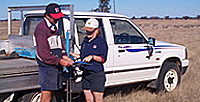Code of Practice
What is the AFSA Code of Practice?
The Code of Practice is a documented set of industry standards for operators involved in the storage, transport and spreading of fertilisers. The Code acknowledges that members have a "duty of care" which requires them to take all reasonable care to prevent or minimise harm to the health and safety of human beings and the broader environment. The Code promotes professionalism and a high standard of business ethics with members needing to demonstrate fair and just business standards, as well as excellence in workmanship, to earn a reputation for honesty and quality of service.
To whom does the Code apply?
All AFSA Members are expected to comply with the Code. People and businesses operating in terms of the Code will stand out from the rest and through consistent application of the Code will develop a competitive edge in the industry sector in which they are working. Members who follow the Code can expect the support of the Association when it is needed, such as when unfair allegations are made against a member.
What is the difference between the Code of Practice and Fertcare?
The AFSA Code of Practice is the foundation of the Australian Fertilizer Industry's product stewardship program Fertcare. The Level A training component of Fertcare - and the national competency standards on which the training is based - are derived from the AFSA Code of Practice.
Members are strongly encouraged to undertake the appropriate level of Fertcare training and attain accreditation as a formal and practical means of proving their ability to meet the AFSA Code of Practice.
Where does Accu-Spread fit in terms of the Code of Practice?
Fertiliser spreading contractors are encouraged to have their machines accredited under the Fertcare Accu-Spread program, so that they know the spread pattern of their machines. If they don't have this information they will not know whether they are spreading the right amount of fertiliser in the right place. An improved understanding of the performance of the spreading machine will enable modifications to optimise performance, reducing operating costs and improving the productivity outcome for the farmer.
Regular Accu-Spread testing is a key component of a spreader operator being able to provide quality assurance to clients. Untested machines may be spreading unevenly, leading to striping in topdressed crops, to costly liability claims and therefore unprofessional and unreliable service.
Support for the Code
The Association is indebted to the Australian Government for its financial support for the development and implementation of the Code.
The AFSA Code of Practice addresses the following topics:




